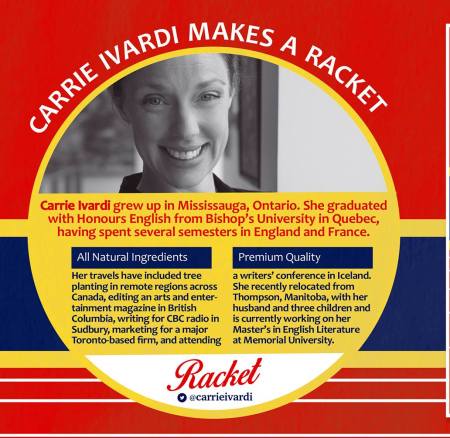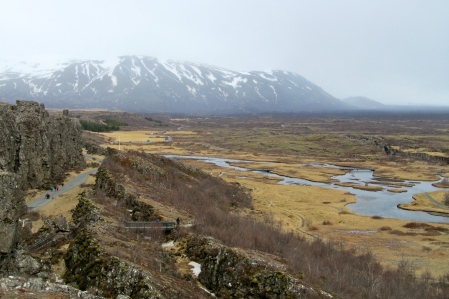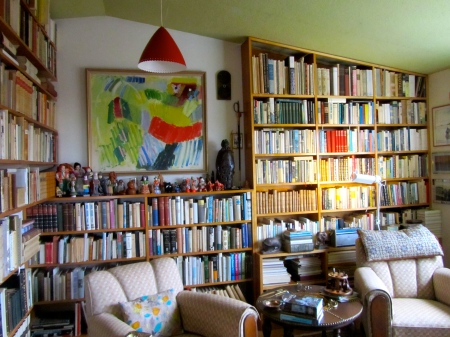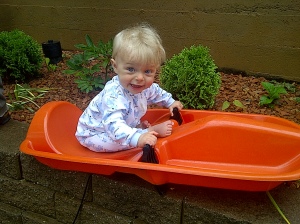
Future Santa in his sleigh?
Here we go, lying to our children. Again. About a jolly, ageless man in a red suit, miraculously popping down a billion chimneys or magically passing through walls to deliver gifts to all the youngsters of the world in a single night. Then, we’re drawn along as though by some magnetic power and forced to buy! buy! buy!
Things.
Why?
To step back from the frenzy is a) to see how ridiculous it is, or, more hopefully, b) to search for the deeper meaning in this, the last month of the year…in children’s Christmas concerts at school, in the music we only listen to in December, or in the opportunities at every turn, church, grocery store, street corner, to give to those less fortunate.
I was in a shop downtown with my six-year-old buying a present for a family member. Suddenly my son looked up at me and said, “Santa isn’t real. Magic reindeer? How does that work?”
I should have patted him on the back and sighed with relief. I should have told him the truth. After all, when the tooth fairy forgot to come the other night, and there were no questions about “real” versus “fairy” I had to wonder, are my children naive? Stupid? Gullible?
One of the books I bought for my daughter this season was A Tree Grows In Brooklyn, by Betty Smith. I couldn’t resist taking a peek. In one scene, Smith’s main character has just delivered her first baby at age 18. She solicits her mother’s advice about how to give her daughter a better life than she has had. Her mother says:
“And you must tell the child the legends I told you—as my mother told them to me and her mother to her. You must tell the fairy tales of the old country. You must tell of those not of the earth who live forever in the hearts of people—fairies, elves, dwarves and such…. and you must not forget the Kris Kringle. The child must believe in him until she reaches the age of six.”
“Mother, I know there are no ghosts or fairies. I would be teaching the child foolish lies.”
Mary [her mother] spoke sharply. “You do not know whether there are not ghosts on earth or angels in heaven.”
“I know there is no Santa Claus.”
“Yet you must teach the child that these things are so.”
“Why? When I, myself, do not believe?”
“Because,” explained Mary Rommely, simply, “the child must have a valuable thing which is called imagination. The child must have a secret world in which live things that never were. It is necessary that she believe. She must start out by believing in things not of this world. Then when the world becomes too ugly for living in, the child can reach back and live in her imagination. I, myself, even in this day and at my age, have great need of recalling the miraculous lives of the Saints and the great miracles that have come to pass on earth. Only by having these things in my mind can I live beyond what I have to live for.”
Instead of responding to my son’s queries in that downtown shop, I allowed him the candy cane the clerk offered. I remembered the images I had as a child of a jolly Santa hurrying through the air behind his team of reindeer.
I can still hear those bells.
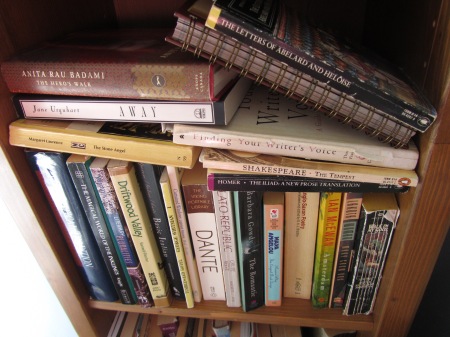 Please, do not close libraries. My children have learned first words and important stories among the books and caring librarians of these establishments. We have spent countless hours of family time in libraries, made new friends, felt part of a community in this otherwise fractured and isolating world. The digital age can NEVER replace what a library does for a community. To be “lost in a book” is an activity, and event, a love that is essential for the intellectual needs of each and every human. A library is where we can all spread out, be drawn to the areas of our own interest, but rush back to each other to share pictures or words in respectful whispers….. Each of these activities teaches us something about being human than a computer never, ever could. We need the opportunities for not only literacy, but also for person-to-person contact that a library offers.
Please, do not close libraries. My children have learned first words and important stories among the books and caring librarians of these establishments. We have spent countless hours of family time in libraries, made new friends, felt part of a community in this otherwise fractured and isolating world. The digital age can NEVER replace what a library does for a community. To be “lost in a book” is an activity, and event, a love that is essential for the intellectual needs of each and every human. A library is where we can all spread out, be drawn to the areas of our own interest, but rush back to each other to share pictures or words in respectful whispers….. Each of these activities teaches us something about being human than a computer never, ever could. We need the opportunities for not only literacy, but also for person-to-person contact that a library offers.